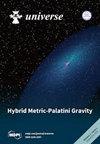类轴心粒子对高能天体物理学中光子偏振的影响
IF 2.5
4区 物理与天体物理
Q2 ASTRONOMY & ASTROPHYSICS
引用次数: 0
摘要
在这篇综述中,我们自成一体地介绍了类轴子粒子(ALPs),尤其侧重于它们对光子偏振的影响:从理论和现象学两个方面进行了讨论。我们推导了光子-ALP相互作用下的光子存活概率、相应的最终光子线性极化度以及宽能量区间内的极化角。目前和计划中的任务,如 X 射线波段的 IXPE(已运行)、eXTP、XL-Calibur、NGXP 和 XPP,以及高能量范围的 COSI(已批准发射)、e-ASTROGAM 和 AMEGO,都可以对上述结果进行检验。具体来说,我们描述了 ALP 对星系团、类星体和伽马射线暴等天体物理源的偏振效应,并讨论了它们的实际可探测性。在这方面,星系团似乎是非常好的观测目标。此外,在甚高能(VHE)波段,我们讨论了光子偏振中奇特的 ALP 特征,原则上能够证明 ALP 的存在。遗憾的是,目前的技术无法探测到如此高能量的光子偏振,但在 VHE 波段观测后一种 ALP 特征的能力可能是未来一个有趣的挑战。事实上,这篇综述的目的是通过 ALP 对光子偏振的影响,展示在 ALP 物理学方面取得进展的新方法,这个话题在过去引起的兴趣较小,但随着许多新的偏振探测任务的出现,现在已经是时候了。本文章由计算机程序翻译,如有差异,请以英文原文为准。
Axion-like Particle Effects on Photon Polarization in High-Energy Astrophysics
In this review, we present a self-contained introduction to axion-like particles (ALPs) with a particular focus on their effects on photon polarization: both theoretical and phenomenological aspects are discussed. We derive the photon survival probability in the presence of photon–ALP interaction, the corresponding final photon degree of linear polarization, and the polarization angle in a wide energy interval. The presented results can be tested by current and planned missions such as IXPE (already operative), eXTP, XL-Calibur, NGXP, XPP in the X-ray band and like COSI (approved to launch), e-ASTROGAM, and AMEGO in the high-energy range. Specifically, we describe ALP-induced polarization effects on several astrophysical sources, such as galaxy clusters, blazars, and gamma-ray bursts, and we discuss their real detectability. In particular, galaxy clusters appear as very good observational targets in this respect. Moreover, in the very-high-energy (VHE) band, we discuss a peculiar ALP signature in photon polarization, in principle capable of proving the ALP existence. Unfortunately, present technologies cannot detect photon polarization up to such high energies, but the observational capability of the latter ALP signature in the VHE band could represent an interesting challenge for the future. As a matter of fact, the aim of this review is to show new ways to make progress in the physics of ALPs, thanks to their effects on photon polarization, a topic that has aroused less interest in the past, but which is now timely with the advent of many new polarimetric missions.
求助全文
通过发布文献求助,成功后即可免费获取论文全文。
去求助
来源期刊

Universe
Physics and Astronomy-General Physics and Astronomy
CiteScore
4.30
自引率
17.20%
发文量
562
审稿时长
24.38 days
期刊介绍:
Universe (ISSN 2218-1997) is an international peer-reviewed open access journal focused on fundamental principles in physics. It publishes reviews, research papers, communications, conference reports and short notes. Our aim is to encourage scientists to publish their research results in as much detail as possible. There is no restriction on the length of the papers.
 求助内容:
求助内容: 应助结果提醒方式:
应助结果提醒方式:


